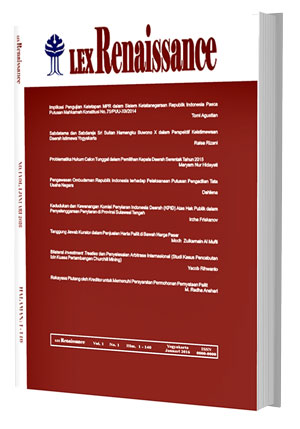Main Article Content
Abstract
Limited Liability Company (PT) is a common form and is widely used in the business world in Indonesia. As a legal entity means that the company is an independent subject. This means that a PT can carry out business activities on its own behalf like humans, have their own wealth, and can be sued or sued before the court. Even so, PT needs organs that can represent itself to do all of these functions. The organs of PT in question are the general meeting of shareholders (GMS), the directors and the board of commissioners. In carrying out their duties, the three organs of PT above must act in accordance with the interests and objectives of the company so that the actions taken by the organs would not harm the company. The practice of concurrent positions of the directors and board of commissioners is a form of management behavior that is considered as a monopolistic practice. This study concludes that concurrent positions is a practice that is prohibited according to the statutory regulations even though it is not clearly regulated in the Company Law, yet in other regulations such as in the Law on State-Owned Enterprises (BUMN), concurrent positions are indeed prohibited.
Keywords
Article Details
Authors who publish with this journal agree to the following terms:
a. Authors retain copyright and grant the journal right of first publication with the work simultaneously licensed under a Creative Commons Attribution License that allows others to share the work with an acknowledgement of the work's authorship and initial publication in this journal.
b. Authors are able to enter into separate, additional contractual arrangements for the non-exclusive distribution of the journal's published version of the work (e.g., post it to an institutional repository or publish it in a book), with an acknowledgement of its initial publication in this journal.
c. Authors are permitted and encouraged to post their work online (e.g., in institutional repositories or on their website) prior to and during the submission process, as it can lead to productive exchanges, as well as earlier and greater citation of published work (See The Effect of Open Access).References
- Buku
- Efendi, Jonaedi dan Johnny Ibrahim, Metode Penelitian Hukum Normatif dan Empiris, Cetakan Kedua, Prenadamedia Group, Depok, 2018.
- Hadi, Zarman, Karakteristik Tanggung Jawab Pribadi Pemegang Saham, Komisaris dan Direksi dalam Perseroan Terbatas, Cetakan Pertama, UB Press, Malang, 2011.
- Harahap, M. Yahya, Hukum Perseroan Terbatas, Cetakan Pertama, Sinar Grafika, Jakarta, 2009.
- Khairandy, Ridwan, Perseroan Terbatas: Doktrin, Peraturan Perundang-Undangan, dan Yurisprudensi, Cetakan Pertama, Total Media, Yogyakarta, 2008.
- S. Sastrawidjaja, Man dan Rai Mantili, Perseroan Terbatas Menurut Tiga Undang-Undang, Cetakan Pertama, CV Keni Media, Bandung, 2012.
- Syamsudin, M., Operasional Penelitian Hukum, Edisi Pertama, RajaGrafindo Persada, Jakarta, 2007.
- Wignjosoebroto, Soetandyo, Hukum Konsep dan Metode, Cetakan Pertama, Setara Press, Malang, 2013.
- Jurnal
- Desilia, Monica, “Pengaruh Interlocking Directorate Terhadap Kinerja Keuangan dan Kinerja Pasar Pada Perusahaan Publik Yang Terdaftar Di Bursa Efek Indonesia Periode 2011-2014”, Artikel IlmiahSTIE Perbanas, Surabaya, 2016.
- Prihandoko, Nugroho Dwi, “Pengaruh Rangkap Jabatan (Interlocking Directorate) dan Proporsi Dewan Komisaris Independen Terhadap Kinerja Perusahaan dan Kinerja Pasar Pada Perusahaan Manufaktur di Bursa Efek Indonesia, Artikel IlmiahSTIE Yayasan Keluarga Pahlawan Negara, Yogyakarta, 2018.
- Peraturan Perundang-Undangan
- Undang-Undang Nomor 19 Tahun 2003 tentang Badan Usaha Milik Negara
- Undang-Undang Nomor 40 Tahun 2007 tentang Perseroan Terbatas
- Undang-Undang Nomor 25 Tahun 2009 tentang Pelayanan Publik
- Peraturan Pemerintah Nomor 96 Tahun 2012 tentang Pelaksanaan UU No. 25 Tahun 2009 tentang Pelayanan Publik
- Peraturan Menteri BUMN Nomor PER-02/MBU/02/2015 tentang Persyaratan dan Tata Cara Pengangkatan dan Pemberhentian Anggota Dewan Komisaris dan Dewan Pengawas Badan Usaha Milik Negara
- Peraturan Menteri BUMN Nomor PER-03/MBU/02/2015 tentang Persyaratan, Tata Cara Pengangkatan dan Pemberhentian Anggota Direksi Badan Usaha Milik Negara
- Peraturan Otoritas Jasa Keuangan Nomor 33 /POJK.04/2014 tentang Direksi dan Dewan Komisaris Emiten atau Perusahaan Publik
References
Buku
Efendi, Jonaedi dan Johnny Ibrahim, Metode Penelitian Hukum Normatif dan Empiris, Cetakan Kedua, Prenadamedia Group, Depok, 2018.
Hadi, Zarman, Karakteristik Tanggung Jawab Pribadi Pemegang Saham, Komisaris dan Direksi dalam Perseroan Terbatas, Cetakan Pertama, UB Press, Malang, 2011.
Harahap, M. Yahya, Hukum Perseroan Terbatas, Cetakan Pertama, Sinar Grafika, Jakarta, 2009.
Khairandy, Ridwan, Perseroan Terbatas: Doktrin, Peraturan Perundang-Undangan, dan Yurisprudensi, Cetakan Pertama, Total Media, Yogyakarta, 2008.
S. Sastrawidjaja, Man dan Rai Mantili, Perseroan Terbatas Menurut Tiga Undang-Undang, Cetakan Pertama, CV Keni Media, Bandung, 2012.
Syamsudin, M., Operasional Penelitian Hukum, Edisi Pertama, RajaGrafindo Persada, Jakarta, 2007.
Wignjosoebroto, Soetandyo, Hukum Konsep dan Metode, Cetakan Pertama, Setara Press, Malang, 2013.
Jurnal
Desilia, Monica, “Pengaruh Interlocking Directorate Terhadap Kinerja Keuangan dan Kinerja Pasar Pada Perusahaan Publik Yang Terdaftar Di Bursa Efek Indonesia Periode 2011-2014”, Artikel IlmiahSTIE Perbanas, Surabaya, 2016.
Prihandoko, Nugroho Dwi, “Pengaruh Rangkap Jabatan (Interlocking Directorate) dan Proporsi Dewan Komisaris Independen Terhadap Kinerja Perusahaan dan Kinerja Pasar Pada Perusahaan Manufaktur di Bursa Efek Indonesia, Artikel IlmiahSTIE Yayasan Keluarga Pahlawan Negara, Yogyakarta, 2018.
Peraturan Perundang-Undangan
Undang-Undang Nomor 19 Tahun 2003 tentang Badan Usaha Milik Negara
Undang-Undang Nomor 40 Tahun 2007 tentang Perseroan Terbatas
Undang-Undang Nomor 25 Tahun 2009 tentang Pelayanan Publik
Peraturan Pemerintah Nomor 96 Tahun 2012 tentang Pelaksanaan UU No. 25 Tahun 2009 tentang Pelayanan Publik
Peraturan Menteri BUMN Nomor PER-02/MBU/02/2015 tentang Persyaratan dan Tata Cara Pengangkatan dan Pemberhentian Anggota Dewan Komisaris dan Dewan Pengawas Badan Usaha Milik Negara
Peraturan Menteri BUMN Nomor PER-03/MBU/02/2015 tentang Persyaratan, Tata Cara Pengangkatan dan Pemberhentian Anggota Direksi Badan Usaha Milik Negara
Peraturan Otoritas Jasa Keuangan Nomor 33 /POJK.04/2014 tentang Direksi dan Dewan Komisaris Emiten atau Perusahaan Publik




